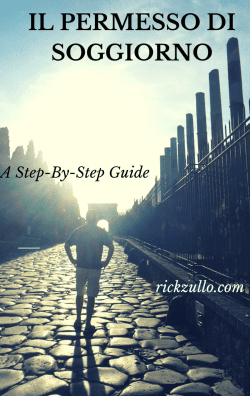 I came across a discussion a couple weeks ago in a Facebook Group called Americans Living in Italy. There was nothing terribly remarkable about this particular thread—its themes were common in this debate: the frustrating challenges of American expats dealing with life in Italy. I guess if anything made this post somewhat unique was that it was mostly civil, and the insults were minimal from both sides.
I came across a discussion a couple weeks ago in a Facebook Group called Americans Living in Italy. There was nothing terribly remarkable about this particular thread—its themes were common in this debate: the frustrating challenges of American expats dealing with life in Italy. I guess if anything made this post somewhat unique was that it was mostly civil, and the insults were minimal from both sides.
However, it also carried a bit more credibility, for a few reasons. First of all, the post’s original author was a disillusioned Italian-American—BUT he grew up speaking Italian with his native-born Italian parents, so he was not totally clueless when he arrived (like I was). Secondly, he lives in The Veneto, so the Italian stereotypes associated with “only” Southern Italy are not valid. Third, he has a good job; a rare condition among American expats in Italy. Lastly, although he used the caps-lock more than necessary, his tone was generally balanced, and he seemed sincerely interested in helping fellow Americans avoid a catastrophic, life-altering decision.
I’ve been back in the US full-time for a while now, which I think gives me some perspective on this debate. For what it’s worth, I’d like to offer some humble advice to my fellow Italy-obsessed Americans thinking of making the leap, and suggest some tips on how to do it right—because I think it CAN be done right—where you fully enjoy the fantasy while acknowledging the uncomfortable realities that you’re forced to confront when transitioning from tourist to expat.
Preparation is the Key
This is common advice, but so often it is ignored, even when repeatedly encountered by several credible sources. Why is it ignored? Well, let’s just say that the romance begins to lose its appeal when you start giving credence to logic and reason. So much more fun to throw caution to the wind and—make the leap!
 But no, as appealing as that sounds, you’ll actually enjoy your experience a lot more if you first do a little tedious check-listing.
But no, as appealing as that sounds, you’ll actually enjoy your experience a lot more if you first do a little tedious check-listing.
Number one is getting your visa in order. Don’t even let yourself daydream until you’re well on your way to acquiring this “Holy Grail.” I’ve written a few posts about the Schengen Visa and the Permesso di Soggiorno. As boring as it is, get the paperwork done fully and correctly before you sign the lease on that Tuscan villa.
Doing the paperwork will force you to address the number two item on the list: your finances. Do NOT make the mistake of assuming that you’ll find work in Italy. You won’t. You can teach English, yes, but I’ve actually had some readers ask me if they’ll be able to advance their career in Italy! Ha! Unless you’re an uber-skilled scientist (or better, a soccer player or supermodel), you’re not offering any skills that 10,000 out-of-work Italians aren’t already offering. And they speak the language. And have connections. And (unfortunately) will probably work for less money than you.
So that leaves you with the following general options:
- Be an underpaid Au Pair or English teacher. Actually, it’s not bad. I taught for a couple years, and it is fun. Just barely pays the bills, but it’s fun.
- Get hired by an American (or possibly Italian) company before you go. This doesn’t happen often, but opportunities exist with some U.S. companies doing business in Italy.
- Create your own (virtual) job in the U.S., and take it with you to Italy. This usually involves some sort of freelance online activity like web development, graphic design, writing, etc. This path offers the most possibilities, and if you want to go this route, I can work with you to help.
- Live off your pension or other passive income. If you’re in this category, then don’t worry, you’ll be fine.
(*Note that options 1 & 3 are technically illegal with an Elective Residency Visa.)
The next obstacle is healthcare coverage. Yes, Italy has “free” healthcare for its citizens and residence, and as an expat you can also opt-in to the system for annual premium. But it’s also worth checking out expat insurance, as it is generally better coverage and much cheaper than equivalent coverage in the U.S.
With respect to the author of the Facebook post, he’s way off base on this one. He argued that U.S healthcare is better. Sure, you can always find isolated examples of bad (or good) medicine anywhere. But the ultimate measure of the quality of healthcare is—wait for it…wait for it—the health of the people living under a given system (and the percentage of their income sacrificed to achieve it). By that standard, there is absolutely no contest. It’s not even close. Italy’s healthcare system is light-years ahead of the American one.
Americans living in Italy
Even once you’ve cleared the above bureaucratic hurdles, you’ll still have the culture shock to deal with. A sciopero (transportation strike) might make for an amusing travel story from your vacation, but it’s no fun when you’re trying to get to work in the rain.
I talked to Damien O’Farrell about this in Episode 38 of my podcast. He’s a mobility expert in Rome, and he helps expats with transitions. If you’re serious about this adventure, you’d be well-advised to consult with him first.
- His Website: Damien O’Farrell Mobility Services
- His Facebook Group: Ultimate Italy
- Our Conversation: Move to Italy the Right Way

To dampen the jolt, wading slowly into the shallow end of the culture is the best approach for most. By that, I mean connecting with one of the expat groups in your city. For me, it was Expats Living in Rome, who helped me in many ways. You won’t feel as isolated, and they’ll share some local knowledge with you to help avoid the most common missteps.
Further, if you’re new to Italy and wish to temporarily preserve your sanity, create an insular environment where Italian idiosyncrasies can’t (often) touch you. Establish a physical and psychological buffer zone, gazing daily at La Dolce Vita from your flower-covered balcony. Venture out to experience the best of Italia when you like, then retreat to your protective bunker again when things get unbearably disorganized (and they will).
Good Wi-Fi is essential (for most of us), in order to remain connected to “civilization” as needed. Which, hopefully, wouldn’t be too often, because let’s face it, civilization is overrated. We come to Italy to escape that, hoping for the idyllic past, right? Well, news flash, it’s mostly gone—but remnants still exist, and they exist in sufficient quantity to fulfill your fantasy if you help it along a bit. Just make sure to squint a little, intentionally blurring your vision so that the ugly details won’t spoil your masterpiece painting. (Is that garbage next to Bernini’s fountain, or ornamental landscaping?)
 And some things are truly and unequivocally better in Italy, fantasy version or not. The food, of course. Note to U.S. expats: STOP pining for Mexican-American food! Just stop. Somebody mentions their “cravings” in every one of these Facebook rants. You’re in Italy, for Christ sake. Cultivate some refined tastes, at least for cuisine. It’s like moving to Germany and being nostalgic for Pabst Blue Ribbon. Uffa…
And some things are truly and unequivocally better in Italy, fantasy version or not. The food, of course. Note to U.S. expats: STOP pining for Mexican-American food! Just stop. Somebody mentions their “cravings” in every one of these Facebook rants. You’re in Italy, for Christ sake. Cultivate some refined tastes, at least for cuisine. It’s like moving to Germany and being nostalgic for Pabst Blue Ribbon. Uffa…
Then there’s the history, the art, the scenery… all of this creates the ambiance of “la dolce vita” that we’re all craving. Who wouldn’t? Even the Italians are enamored by our rose-colored view of their country.
In other words, if you’re truly able to achieve and sustain that level on self-delusion (it IS possible, I’ve done it, and it’s wonderful), then Italy is absolutely the best place in the world to live.
I should probably end it here, because that is exactly my point: Italy CAN live up to the hype, but it will require a good bit of assistance from you personally. Expecting too much of the fantasy to be handed to you is a recipe for disappointment.
If you’re interested in the Facebook post and subsequent rants that inspired this article, pour yourself a Campari cocktail, and spend a few minutes scrolling through the debate. Good arguments are made on both sides (as well as plenty of nonsense in between).

As an Italian expat to the U.S. for the past 25 yrs….I am not making any plans to retire back in Italy. My partner wants us to go and retire in Italy… He has been back in Italy with me few times…as tourists….He just loves it ..but I am afraid his love for Italy is a Felinian like love…He still has this picture of Italy lost in the 60’s…even though the last time we were there was less than 2 yrs ago….Yes, it is my native country…Beautiful scenery everywhere…Mountains, hills, breathtaking seacosts…Museum..the Colosseum….the gelato…la Pizza…etc.etc…etc….but as someone else has said…there are some very irritating inconveniences in living in Italy vs the U.S. As an Italian…I cannot digest the way customers are treated in Italy..and the way to often transportation strikes…just .to mention some of the things that truly send me spinning with a sky rocketing high blood pressure….Italy, is definitely not a place for the light hearted….It takes indeed lots and lots of patience…which in my approaching retirement age…I do not have anymore…..Ideally, as was mentioned…Italy is best enjoyed by living there not more than 2-3 months at a time….more than that…..I myself an Italian, from Rome…cannot handle anymore…..I am dreaming to retire somewhere in a small town in the PNW….away from all the craziness and just limit my Italian visits to perhaps a month or two out of the year . Unfortunately, we have now a political class in Italy that is not helping making things better….As we say in Italy…Si stava meglio prima, quando si stava peggio….Good luck to all of you that are strong enough to handle life in Italy for the long run…I admire your determination….and yes learning and speaking Italian, and make good Italian friends, will help you open doors that would otherwise not be opened….
Carlo, I totally agree with you. I am from Milan and lived in Southern California for 25 years and in Italy now, to help my elder parents. I have been here for over 7 months I am not a happy camper, to say the least.
Italy would be a fantastic place, if we could remove all the politicians and a good part of people’s mentality.
I do not miss Milan and don’t plan to go back, but for those Americans that decide to try life in Italy, this city is certainly a good start, since it has it all and the system works better than in other cities…at least going south.
Hi Graziella. Those are interesting comments… I’m not sure I understand, though, are you back in Italy now? In Milan? I do agree that Milan would offer the “softest” transition for American expats. Then again, if someone is going there for the full experience that they’ve envisioned, they might be disappointed that Milan isn’t “Italian” enough. Well, I don’t know. But it’s an interesting topic of conversation. Ciao. Rick
Hi
Yes, you need to keep an open attitude and look at differences and difficulties with humor. Knowing the language helps a lot as most Italians like to talk with you about this country’s peculiarities.
Hi everyone, I want to move to the Italian countryside when I retire. I want to live a quieter, more peaceful and less expensive life. I want to be able to have a little garden, volunteer at an animal shelter, and be around people when I choose to. I’m an artist, a home-body, an animal lover and a friendly introvert. I’ve not seen any posts about living in the country. Does anyone have any recommendations?
Hi Gina
I am living in Italy since 2008 in the countryside south of Milan. You may try my book Living in Italy to know what it is like, see http://italiaanse-toestanden.duepadroni.it/index-UK.html
Ciao
Stef
I think part of the problem may be that too many people who do this have never lived anywhere else than the U.S. Many of the things which so bother them are not unique to Italy, but are pretty common certainly in southern Europe. For example, the bureaucracy is no better in France, in my experience. Even Europe wide there are differences. I know natives of Belgium with excellent jobs who don’t have clothes dryers or electric dishwashers. Fuel is exorbitantly expensive, and people consider these kinds of appliances wasteful. Living in northern Europe, while certainly more efficient, presents its own challenges. People are extraordinarily rigid, in my opinion, very cool and unwelcoming. Even in Britain, which you would think would be easy for Americans, I know people working for years in London who have yet to “crack” the barrier into acceptance into the community. I infinitely prefer living in Italy to living in Germany.
If you want all the comforts of home, stay home. Or, just go on visits. Otherwise, pick the country which most suits your temperament. As to the naivete which would lead someone to think that one can just “pick up” a decent job in a country with chronic unemployment, I almost have no words.
An interesting read if you’re thinking about moving to Italy:
‘If you want to move to Italy, brace yourself for things not going the way you want’
https://www.thelocal.it/20170710/relocation-expert-advice-how-work-business-italy-expat-career
Thanks, Earl. Yes, I read that, too, and thought the same thing. Damien always has solid advice. The thing is, it CAN be done right, it just takes A LOT of pre-planning. And realistic expectations. Ciao!
To some people, the “grass is always greener.” Although I would like to live in Italy part time, of course not everything is perfect there. Where is it perfect? Family and friends are the most important thing in life. The Italians living in Italy have discovered this!
Great post, Rick. We are still waiting for our Italian passports to be issued (approved for dual citizenship 11/2015) we are learning all about patience with the Italian government before we even get there.
Excellent training! It sounds like you have the right attitude, so I think you’re going to do great and really enjoy “Your Italian Journey!” Ciao!
I absolutely loved this post and agree with every word. I think you can be a happy expat in Italy but not without putting in prep and effort and actively adjusting parts of your behavior and perspective. I literally wrote about this two weeks ago too!! Hugs from Bergamo.
http://www.questadolcevita.com/blog/quiz-time-will-you-be-a-happy-expat-in-italy
Rick,
Thanks for the pragmatic and well-grounded advice about living in Italy. Too often people seek a new way of life filled with romantic, unrealistic expectations hoping to escape the problems of their previous lifestyle only to find new ones.
For most people, becoming a part of the Italian culture as anything other than a tourist is a very difficult transition. What one reads in books and sees in movies and on television is nothing at all like what one actually experiences – in Italy or elsewhere.
I have found during my time in Italy that one must embrace the local culture – warts and all. One must welcome the magic and charm of the new culture, as well as accept its shortcomings. Pining for the way things were in one’s old environment alienates those around you and intensifies personal misery.
Go where the locals go. Be as Italian as possible. Go to markets, bars and restaurants that rarely have English speakers. Avoid anything that screams ‘tourist.’ Dress like an Italian. Ride the bus and Metro. Take local and regional trains. Live in a neighborhood never frequented by tourists. Learn to speak the language, as best you can. It will be appreciated by everyone with whom you interact. Basically, live your life like an Italian. It has worked for me.
Grazie mille! Chi bestia va a Roma, bestia ritorna.
Yes, yes and yes!! Live your life like an Italian…probably cause less agita!
Brava, Wynne!
Wise words, indeed, Earl. I actually “get” both sides of the argument, as I know you do. I think it comes down to if Italy is a good “fit” for someone or not, as we are all have different tastes and expectations. And as you know, Italy won’t let you be neutral. 99% either love it or hate. I love it, too.
Rick, I believe the exact same thing, that Italy is for some people and not others. The problem is so many people come thinking that it’s for them and leave (or even worse, continue to live) completely disillusioned.
Yes, that about sums it up. There is really a lot of false expectation. Those with the patience and desire to dig deeper will actually learn to love the country even more, despite all of its (many) faults. Those who want a fantasy on a silver platter will be very disappointed.
Love your comment Earl!
Rick, Thank you for your fun and interesting take on the remarks on the FB “Living in Italy” page.
I read it and share your reaction though you were more restrained than I.
Certainly, there are problems living in Italy (I live in Lucca after a year in Cortona), but life isn’t perfect anywhere.
The original post struck a nerve with many and I hope people considering a move here learned some of the areas to consider.
My biggest problem with the post and many of the responses is that they come off sounding like victims.
Hey, we choose to live here and it’s up to us to get involved in the life here. That means volunteering, attending meetings, learning the language, paying attention to politics and current events, etc. Same as if we are living in USA or any country. They all are better when all citizens are involved.
Very good observations, Michael. Yes, too many people are passively waiting for happiness instead of making it happen. And sometimes Americans in particular can carry a sense of entitlement with them when traveling abroad, which doesn’t help. Thanks so much for your insights. By the way, Lucca is spot that I always thought offered a good comprise between the best and “worst” of Italy. Would you agree? As you say, nowhere is perfect, but each person needs to figure out which frustrations they can live with, and which are deal-breakers.
you are so right! if you were a whiner in the USA, you are a whiner in Italy, or France, or wherever you choose to go. I am with you — we are INVOLVED in our life.
YES!!
Sound advice! I know that I would go with rose-colored glasses, for sure. I am NOT a patient person, and the Italian bureaucracy would drive me insane. That’s why 90 days at a time works well for me!
Also – when/why did you return to the States?! I missed that somehow!
You know, the 90-days at a time strategy is a pretty good one. Long enough to enjoy “settling in,” but short enough to leave you wanting for more! I’ve been back for a while now, but I’d love to do the 90-day thing again some day!
I can only wish and dream that I could do this. My daughter is living the dream in Germany. But, I’m sure there are Mexicans who think they have refined taste in their own country 😉
Oh, I KNOW there are many Mexicans who have refined tastes. If you read my comment again, you’ll see that I was referring to Americans craving Mexican-American “cuisine” like chalupas, etc.
Hi, Rick. Great points. Now that we are back in the U.S. (and it was always the plan to return after a few years in Rome), people constantly ask me why we came back, why we did not stay in Italy. They cannot fathom that there might be challenges. We adapted well in Italy, but it was still challenging. It is not an easy place to live full-time. We Americans are so accustomed to having everything when we want it, the way we want it, at a price we want to pay.
We miss many irreplaceable things from our lifestyle in Italy (great health care, walking lifestyle, trains!), but I am also happy to re-embrace the way things work here in the U.S.
Wow, Laurel, I think you summed up what I was trying to say in about 1/10 of the words! Absolutely spot-on!
Laurel, For someone who was “living the dream” in Italy, what specifically was challenging? As tourists, we are obviously isolated from those realities, but so curious as to “down to earth” examples…Grazie!
Hi Rita. First let me say I miss Italy every day…the good parts! And we are going back for a long visit this fall. But LIVING there had challenges. I have written about the good and the not-so-good on my blog, GoodDayRome.com so you might enjoy reading some of that, especially since August when I started writing about leaving. But a few down-to-Earth examples for you:
– Clothing is very expensive in Italy, and sold mostly in tiny boutiques. God help you if you try to make a return. There is no customer service.
– Walking down the street in Rome is a contact sport. And when it is not some clueless person exiting a store without looking and stepping right in front of you, it’s a vehicle parked in the pedestrian crossing “because white areas are free parking, right?”
– Arguing with a bank teller will take your language skills to a new level
– Landlords. Apartment rental is a whole different animal. You end up paying for things you would not in the U.S.
– In Italy, I could not run multiple appliances at the same time. In our embassy apartment, which had enhanced electrical service, it wasn’t horrible, although I did knock out the power when I tried to make a Nespresso while washing clothes when the A/C was on. In our post-embassy apartment I could not even run the washer and iron clothes at the same time. And we didn’t have A/C.
– 60-day notice to disconnect the Internet was kind of the last straw. We had to pay for 45 days of service we didn’t use because we did not advise them IN WRITING soon enough.
It is a beautiful and charming country with many lovely people, and I felt physically safe at all times. LOVED the ability to travel so easily without an airplane. Health care was fabulous. But Italy also rejects change and does not improve that which does not work. There is often a collective shrug and too often one hears “It’s always been that way. It’s Italy.”
All great examples, Laurel, and I think your final paragraph really says exactly what I would say, too.
I am going to have to reply as someone who knows Italy well. Overall, you do not have a good grasp of Italy. Additionally Americans always tend to hang around other Americans, which is NOT how you experience a country.
“Clothing is very expensive in Italy, and sold mostly in tiny boutiques. God help you if you try to make a return. There is no customer service”
Could not disagree more. Shop around and you will find all kinds of clothing. From dirt cheap to overly priced. Yes, you can return clothes within even 60 days in department stores.
“Walking down the street in Rome is a contact sport. And when it is not some clueless person exiting a store without looking and stepping right in front of you, it’s a vehicle parked in the pedestrian crossing “because white areas are free parking, right?”
I disagree. You are picking and choosing very specific places. I get the feeling you did not go out and actually see much of Italy.
“Landlords. Apartment rental is a whole different animal. You end up paying for things you would not in the U.S.”
Tenants pay for rent and for what they consume (electricity, water), so called ordinary expenses. Tenants do NOT pay for repairing broken boilers or maintenance. So called extraordinary expenses. Seems VERY fair.
“In Italy, I could not run multiple appliances at the same time.”
That is hardly a problem. I think you are not very flexible but want to stick to how you normally do things.
While it is easy to find exceptions, overall I think Laurel’s comments were very accurate. I used to have an apartment in Florence and at various times have rented all over Italy. Her experiences seem to mirror mine. And the contact sport reference is very true. Not just in Italy, but throughout southern Europe. I’m in Spain now and find it difficult adjusting to people on the street constantly knocking me. It’s a cultural thing. In the United States it would be considered rude. Here it’s just how things are. Another pet peeve of mine in Italy and Spain is how people always cut in front of you in line. I’ll never understand that. When living elsewhere one must make adjustments to be happy. Living in another country will never be like home – and I don’t want it to be. Ciao!
Not really. From Rome on down it is more like that. From Rome on up it is not like that. Ciao!
Mario – Yes, the north is a bit different. At least they don’t park on the sidewalks there! I lived in Rome so that is my perspective on daily life. Rita asked for some specifics as Americans who have traveled to Italy believe it must be “a dream” to live there and cannot imagine what challenges there might be. We loved our experience in Italy. In fact, we are traveling here now, but there are some realities for those who have not lived there.
Every place has realities that come into play after awhile. I now live on the Oregon Coast. It is lovely! But in the summer, when our town of 8500 becomes 28000, it is not the dreamy place I experienced as a tourist before we lived there. It is a crowded mess of tourists.
I am an American and have lived in Italy (in the Apennines) for two years. Before that I lived in Paris for 20 years. I personally think Italy is easier.
The most important things are:
1) to have a positive attitude: I believe this is going to be the best day of my life.
2) speak the language. Imagine going to a bar or the post office in the USA and only speaking Italian or French to the person behind the counter. Think that will work on a regular basis? I doubt it. Same here. Italian is easy, and everyone wants to help you.
Check out my Italian blog: http://www.artnotesitaly.wordpress.com.
Thanks for your input, Laurie!
100% agree with Laurie. Attitude! Be nice and be open to learning new think. We moved to Italy 4 mounts ago to Verona with small kids 5 years old and 6 months old. Challenging – yes, but there so many positive thinks happened with us. We are so lucky that we can travel and choose the place when you want and how you want to live in our crazy world! 🙂
Rick – great article. Thanks!
That’s great, Jelena, that you were able to do it with two little ones! Be careful, that 5 year-old will be fluent in Italian before your 1 year anniversary! 🙂